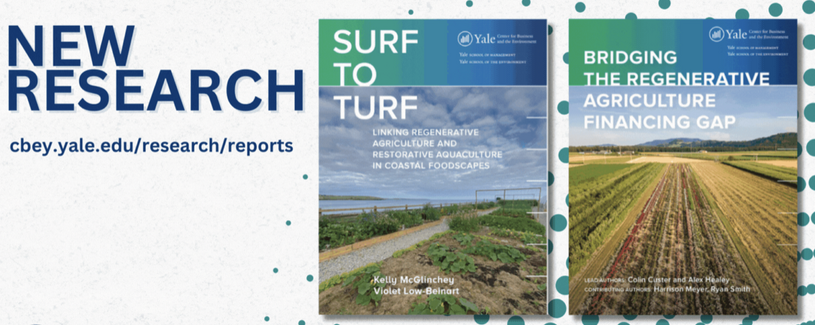New Research on Regenerative Agriculture
Two new reports examine opportunities to improve and advance regenerative agriculture practices in order to combat climate change, enhance food system resilience, and promote worker and community wellbeing.

The Yale Center for Business and Environment (CBEY) today announced the release of two new reports examining options to improve and advance regenerative agriculture practices, “Bridging the Regenerative Agriculture Financing Gap,” and “Surf to Turf: Linking Regenerative Agriculture and Restorative Aquaculture in Coastal Foodscapes.”
“Fostering opportunities to expand regenerative agriculture practices not only has the potential to help decelerate global warming, but also make our food systems more resilient against climate impacts," said Stuart DeCew, Executive Director at CBEY. "In order to do that, we must listen to and share the expertise and imagination of the generations of people who are closest to the challenges facing our food and agricultural systems. They are our most valuable resources and this new research shares what we've heard and learned from those closest to the problem."
The first report, Bridging the Regenerative Agriculture Financing Gap, proposes a new foundation for financing regenerative farms that takes into account the three factors that make financing regenerative agriculture difficult: outdated financial models; difficult financial returns; and cultural differences between farmers and investors.
As the report discusses, food companies, investors, multinational institutions and governments are making pledges to invest billions of dollars in regenerative agriculture. Yet in the midst of a stream of funding and interest, farmers themselves are being left behind. Whether its outdated funding structures, cultural disconnects, or outsized expectations, both investors and farmers have struggled to find the right partner for their goals.
Through this research, the report seeks to inspire this thoughtful investment, and help finance professionals discover new partnerships to help farmers, the planet, and their communities thrive.
"There has been a tremendous amount of discussion about what regenerative farming means, but very little about how to support it," said report author Colin Custer. "Traditional financing tools are woefully outdated, but fortunately there are many firms who are taking a better approach. This report highlights many of them, so we can advance the conversation on how we as an agriculture community can better support regenerative farmers in their work."
Click here to view the report.
The second report, Surf to Turf: Linking Regenerative Agriculture and Restorative Aquaculture in Coastal Foodscapes, explores the history of sea-to-soil connections in food and agriculture, best practices and examples of these approaches at work today, and the opportunity they present for deep and meaningful food systems transformation on land and at sea.
“The collective future of the world’s oceans and soils, and the communities who depend upon both, will be shaped by how we grow, harvest, transport, and consume our food today,” said report author Kelly McGlinchey.
As discussed in the report, coasts represent some of the world’s most dynamic and vital regions of food production. Yet, farmers and fishermen alike face an unprecedented array of ecological, economic, and societal challenges today. Circular practices involving restorative aquaculture and regenerative agriculture methods have garnered attention in recent years, yet marine-based foods and land-based agriculture are often still considered and managed in silos
Through restorative ocean farming and “surf-to-turf” practices, the report examines opportunities to build a bridge between land- and sea-based food systems and, in doing so, enhance the overall resilience and vitality of both.
“Linking regenerative agriculture and restorative aquaculture practices and implementing an ecosystems-level approach to managing coastal foodscapes can generate new climate solutions while restoring historical connections between ocean and soil health,” shared report author Violet Low-Beinart.
Click here to view the report.
Together, these two reports offer recommendations to improve and advance regenerative agriculture practices in order to combat climate change, enhance food system resilience, and promote worker and community wellbeing. These reports are part of CBEY's initiative to feature student-led research projects around how to inspire, support and finance regenerative agricultural practices.